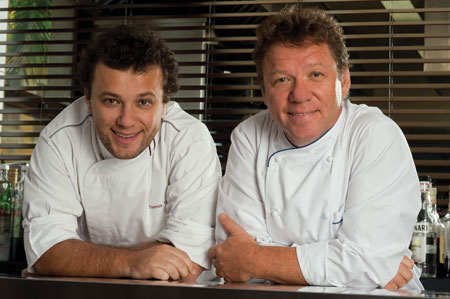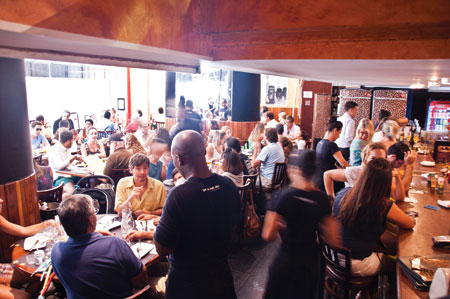A taste of Brazil
From street food to native Amazonian cuisine, a new generation of chefs is highlighting what a serious gourmet destination Brazil has become. Luciana Bianchi reports
For many years a number of clichés were associated with Latin American countries, especially with Brazil. Many were used for commercial profits, but none expressed reality.
Yes, this is the ultimate holiday country for people seeking good weather, fun and beautiful people. However, Brazil is much more than just a tropical paradise and a party route. It has also become a serious gourmet destination. A new culture promoting authenticity is coming to the fore in Brazil, particularly in the restaurant scene.
spread around the country and influenced a generation of chefs. That was the beginning of the new Brazilian cuisine that we see today.
There is a growing sense of national pride for all things Brazilian, not only in the food industry, and unconnected to the World Cup. This is evidenced by the keen interest in native and wild products all over Brazil, in childhood memory dishes, and in the greater awareness of sustainability and ethics. There is a desire for honest proposals, for creative and authentic ideas, and a wish to celebrate comfort food and traditional dishes, too. Of course there is also commercial exploitation of Amazonian and indigenous themes for marketing purposes, and it is possible to find claims for 'authentic Amazonian cuisine' in restaurants all over the country.
Most foreigners don't realise the dimensions of this beautiful country. To give an example, the distance between SÁ£o Paulo and Belém is approximately the same distance
as between London and Casablanca, crossing the whole of France and Spain.
The only region that practises terroir cuisine is ParÁ¡, a state that is part of the Amazonian rainforest. The capital city, Belém, is the birthplace of the father of Brazilian cuisine, Paulo Martins, who died in 2010. The city became famous too a few years ago, when a family turned their living room into a village restaurant, which since then has been declared by many publications as the best fish restaurant in the country - Remanso do Peixe.
Now Thiago Castanho is becoming the one to watch in the city. He is chef at Remanso do Bosque, and the 26-year-old embodies the Brazilian chefs, working with Amazonian producers, artists and artisans.
"Our food celebrates the richness of our region," says Castanho. "We now have traditional and contemporary food under the same roof. Our tasting menu has
evolved from the food of my father. We celebrate his cuisine every day with Á la carte comfort food dishes. It reflects our own contemporary ideas and we also revisit
traditional dishes. This is our story."
Similar stories can be seen throughout the country that are just as authentic, even if they do not match the Castanhos' practice of localism. Thus, the cuisine of Rodrigo Oliveira, chef of MocotÁ³ in SÁ£o Paulo, pays homage to the backlands of Brazil - an arid area in the north-east region. To provide food for the workers of the backlands living in SÁ£o Paulo, Oliveira's family started a small village gastrobar in the 1970s - it is now the most loved restaurant in Brazil's capital city of gastronomy.
This is a cuisine that doesn't depend on wild produce and can be reproduced in SÁ£o Paulo. At MocotÁ³, there are no reservations and people can wait for hours in a queue. It has one of the best cachaÁ§a bars in the country. This Brazilian sugar cane spirit has also seen a significant change in its status in the last 20 years, turning from a cheap drink for the poor to a chic beverage in the finest bars. Artisan beers are a new phenomenon, and the Castanhos give privileged status to their 'Amazon Beer' brand, made with Amazonian fruit.
Many restaurants in Brazil offer a large selection of local beer and ale - a new trend that is turning many chefs into beer enthusiasts. Street food is also changing its status from kitsch to chic, and the food truck is becoming fashionable, promising another new food revolution. Top chefs, such as Jefferson Rueda of restaurant Attimo and Raphael Despirite of Marcel, are taking part in street markets, bringing 'haute fast food' to the public.
"Every day we see more people becoming interested in the flavours of the countryside, in the food of grandmothers and all kinds of comfort food, but with a contemporary approach," says Rueda.
His restaurant is another example of the new 'back to the roots' trend in Brazil. Telling the story of Italian immigrants in SÁ£o Paulo, Rueda manages to offer at Attimo a balance of comfort and contemporary cuisine. The chef makes cured meat in-house, revisits dishes from the countryside, but with innovative aesthetics and an elegant fine-dining setting.
Rueda's wife is the chef at Bar da Dona OnÁ§a, the most popular address for people seeking home-made food and bohemian dining.
The most famous Brazilian dish, feijoada (black bean and pork stew), savoury snacks and nostalgic home dishes are the speciality of the house. And, of course, it also serves caipirinhas, using cachaÁ§a and native fruit in exciting new combinations.
This gastro-bar offers food that people used to cook at home between the 1950s and 1980s, when many houses had a maid cooking for the family:
"There is a sense of culinary nostalgia in the country. We offer comfort food and childhood memories," says Janaina Rueda. Nikkei cuisine is also in vogue in Brazil, and SÁ£o Paulo is the heart of the Japanese community. Top Japanese chefs, such as Tsuyoshi Murakami, tend to stay truthful to classic Japanese principles, but are introducing more native Brazilian ingredients to their menus.
His restaurant, Kinoshita, offers a classic Kappo concept with Brazilian ingredients.
"Brazil has unique products, and some ofthem make great partners with Japanese concepts. At Kinoshita, the classics are untouchable, but we have our signature dishes
that play with wild products and indigenous fish," says Murakami.
Last month, the big news was the visit of Michelin inspectors to both SÁ£o Paulo and Rio de Janeiro, opening speculation about the publication of a Red Guide in Brazil in 2015 - the first in Latin America. This could be another good sign of the growing international recognition of Brazilian cuisine, and could bring a lot of new gastro-tourists to the country.
Navigating Brazil's gastronomic jungle
The gastronomic capital city of Brazil is still SÁ£o Paulo, after all these years. The urban jungle offers a wide variety of cuisines, from original Brazilian to ethnic.
Pizzerias, churrasco steak houses and bars with finger foods are deep-rooted in Brazilian culture.
There are many 'tourist addresses' for pizza and meat, but Braz, Veridiana, Figueira Rubaiyat, Baby Beef Rubaiyat, Vento Haragano and Varanda Grill are also
favoured by Paulistas (people from SÁ£o Paulo).
One can eat every day in a different restaurant in SÁ£o Paulo, and find many good options and all styles - from street food to fine-dining. However, Rio de Janeiro has been making headlines recently with its high-end restaurants, and is fast becoming the second destination for foodies in Brazil.
The newest opening in Rio de Janeiro has already been quoted by specialists as the future best restaurant in Brazil. Lasai is run by chef Rafa da Costa e Silva - the
ex-right hand of Andoni Luis Aduriz at Mugaritz. He has created his own vegetable farm, and is practising a Brazilian farm-to-table fine-dining experience - the first in the country.
Belém, in ParÁ¡ state, is also becoming a new foodie destination, with a strong culture of street food.
Thiago Castanho, of Remanso do Bosque, believes that the interest in his work and that of other young chefs from other cities in Brazil helps to decentralise the focus on SÁ£o Paulo and Rio de Janeiro.
"For many years our guests were only from our region," he explains. "SÁ£o Paulo and Rio de Janeiro have great restaurants and a lot of options for eating out. However, we are working hard to motivate people to visit other regions too. In ParÁ¡ state, Amazonian cuisine is part of our everyday life. We work closely with our local producers; many of them live in the forest or on simple farms. Our fish is local, and we have sustainable and wild produce that is fresh very day.
"We are seeing many more people travelling for the sole purpose of visiting good restaurants. For that reason, authenticity in the menu and the quality of ingredients are becoming the most important aspects of choice for our guests. People are happy to travel a long way if they are going to have a unique experience."
Concepts at the cutting edge
Chef Thomas Troisgros of restaurant Olympe, and son of Claude Troisgros, recently opened a new restaurant with a very original concept in Rio de Janeiro. His TTBurger gives the personality of a Carioca (a native of Rio de Janeiro) to a classic American fast-food concept. His ketchup is made of guava fruit, his bread is made of Brazilian root vegetables, and his cheese is from the countryside.
Meanwhile, Oro chef Felipe Bronze, famous for his avant-garde ideas and the most awarded contemporary chef in the city, has added many street food concepts
to his tasting menu.
In 2013, he opened his second site, this one with a casual Brazilian tapas bar concept. Called Pipo, the menu stages beach and street food, mini dishes, cocktails and beers - branding the house with full Brazilian flavours and nostalgic dishes.
"I think the great success of Oro and Pipo stems from the desire of people in Rio de Janeiro and other Brazilian cities for a more casual, contemporary approach to
dining. People want to eat great food, but with less formality," he says.
Following on with the more casual approach, Roberta Sudbrack (the chef that is most followed on Brazilian social networks), has created a strong concept around comfort fine-dining at her eponymous restaurant. Here there are no molecular games or high-tech kitchen appliances.
At Roberta's kitchen, fire andslow cooking are top of the agenda,with a minimalistic and elegant aesthetic.
Catering for the crowds
During the World Cup, many gastro-bars and restaurants will offer special menus. This is certainly the case in Bar da Dona OnÁ§a in SÁ£oPaulo. "We are already seeing an increase in the number of foreign guests," says chef Janaina Rueda. "Our feijoada day used to be on Saturday, but now, by popular foreign demand, we are serving feijoada on Wednesdays as well.
"During the World Cup, we are going to offer a special deal, allowing people to watch the matches in our restaurant with a 100% Brazilian bar experience - finger food and a 'Brasileirinho' drinking menu with caipirinhas, cold beers and wines, all made in Brazil."
In the city of Vitoria, chefs Barbara Vezzola and Pablo Pavone of Restaurant Soeta, say they will keep their tasting menu as it is, but will add a little touch of Brazilian colour to some dishes, as well as some special drinks.
Helena Rizzo and husband Daniel Redondo of restaurant Mani, considered by many to be the best fine-dining restaurant in the country, are putting the last touches to a major refurbishment in the kitchen and entrance area.
However, they will not make any changes to their menu during the World Cup. The same attitude is taken by Alberto Landgraff of restaurant Epice, and this seems to be the standard position of most fine-dining restaurants.
However, Brazilians are famous for their last-minute organisation, their lack of punctuality and their easy going attitude to everyday life, so changes may still happen.
And even if most Brazilians seem to be saying the same thing ("I want to be far away from here during the World Cup!"), we all know that when it kicks off, nobody will be oblivious. One thing we know for sure - the hosts of this World Cup cannot resist a party and they will make this an unforgettable event.












